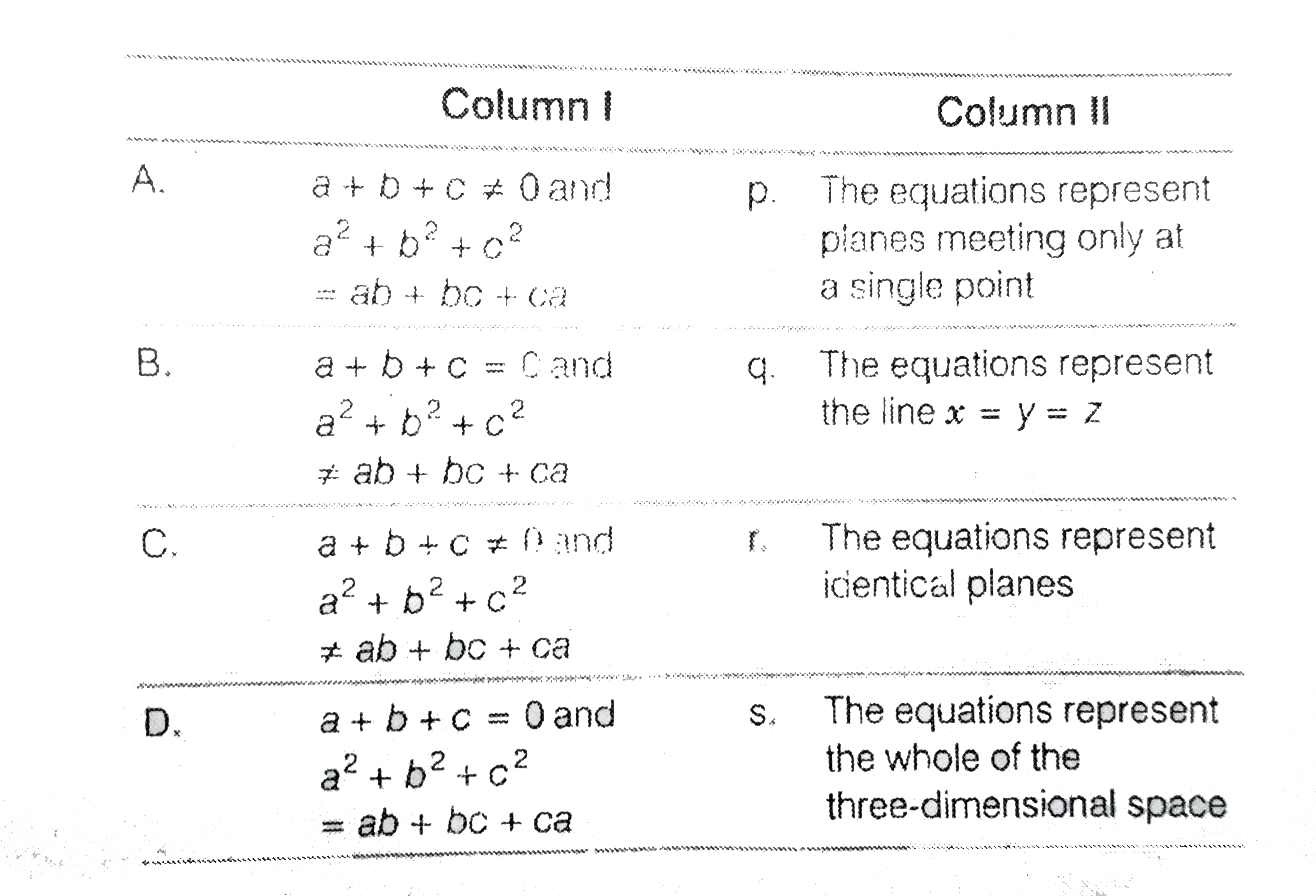If a+b+c=0anda2+b2+c2−ab−bc−ca≠0,∀a,b,c∈R then the system of equations
ax+by+cz=0,bx+cy+az=0 and cx+ay+bz=0 has
A unique solution
Infinte solutions
No solution
Exactly two solutions
The correct Answer is:B
To solve the given problem, we need to analyze the system of equations:
1. Given Equations:
ax+by+cz=0
bx+cy+az=0
cx+ay+bz=0
2. Condition:
We are given that a+b+c=0 and a2+b2+c2−ab−bc−ca≠0.
3. Forming the Coefficient Matrix:
The system can be represented in matrix form as:
⎡⎢⎣abcbcacab⎤⎥⎦⎡⎢⎣xyz⎤⎥⎦=⎡⎢⎣000⎤⎥⎦
4. Finding the Determinant:
We need to find the determinant of the coefficient matrix:
D=∣∣
∣∣abcbcacab∣∣
∣∣
Using the property of determinants, we can expand this determinant:
D=a(bc−ac)−b(bc−ac)+c(ab−ba)
This simplifies to:
D=a3+b3+c3−3abc
5. Using the Condition a+b+c=0:
From the identity a3+b3+c3−3abc=(a+b+c)(a2+b2+c2−ab−ac−bc), and since a+b+c=0, we have:
D=0⋅(a2+b2+c2−ab−ac−bc)=0
6. Conclusion on the Nature of Solutions:
Since the determinant D=0, the system of equations has either a unique solution or infinitely many solutions. However, since a2+b2+c2−ab−ac−bc≠0, it indicates that the system is consistent and dependent, leading to infinitely many solutions.
Thus, the final answer is that the system of equations has infinitely many solutions.
ax+by+cz=0
bx+cy+az=0
cx+ay+bz=0
We are given that a+b+c=0 and a2+b2+c2−ab−bc−ca≠0.
The system can be represented in matrix form as:
⎡⎢⎣abcbcacab⎤⎥⎦⎡⎢⎣xyz⎤⎥⎦=⎡⎢⎣000⎤⎥⎦
We need to find the determinant of the coefficient matrix:
D=∣∣
∣∣abcbcacab∣∣
∣∣
D=a(bc−ac)−b(bc−ac)+c(ab−ba)
This simplifies to:
D=a3+b3+c3−3abc
From the identity a3+b3+c3−3abc=(a+b+c)(a2+b2+c2−ab−ac−bc), and since a+b+c=0, we have:
D=0⋅(a2+b2+c2−ab−ac−bc)=0
Since the determinant D=0, the system of equations has either a unique solution or infinitely many solutions. However, since a2+b2+c2−ab−ac−bc≠0, it indicates that the system is consistent and dependent, leading to infinitely many solutions.
Topper's Solved these Questions
Similar Questions
Knowledge Check
Three lines px+qy+r=0, qx+ry+p=0 and rx+py+q=0 are concurrent , if
AΣa3=3abcBσa=0CΣa2=ΣabDNoneIf a, b, c ∈R and 2a + 3b + 6c = 0, then the equation ax2+bx+c=0 has
Aat least one root in [0,1]Bat least one root in [2,3]Cat least one root in [-1,0]Dat least one root in [−∞,1]If the system of equations
bx+ay=c,cx+az=b,cy+bz=a
has a unique solution, thenAabc=1Babc=−2Cabc≠0Dnone of these
Consider the following linear equations
ax+by+cz=0,bx+cy+az=0,cx+ay+bz=0

View SolutionConsider the following linear equations
ax+by+cz=0,bx+cy+az=0,cx+ay+bz=0

View SolutionIf a,b,c∈Randa+b+c=0 and th esystem of equations ax+by+cz=0,bx+cy+az=0,cx+ay+bz=0 has a non-zero solution, then a:b:c is given by
View SolutionIf the lines ax+by+c=0,bx+cy+a=0 and cx+ay+b=0 be concurrent, then:
View Solutionx+ay+a²z=0,x+by+b2z=0,x+cy+c2z=0,a≠b≠c then given system of equations
View Solution

